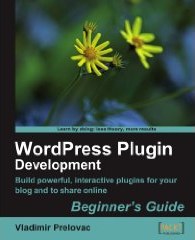WordPress Plugin Development: Beginner’s Guide, by Vladimir Prelovac
 I have recently finished reading Vladimir Prelovac book on WordPress plug-in development, (WordPress Plug-in Development: Beginner’s Guide, Packt Publishing, 2009).
I have recently finished reading Vladimir Prelovac book on WordPress plug-in development, (WordPress Plug-in Development: Beginner’s Guide, Packt Publishing, 2009).
As an experienced WordPress plug-in developer, I was pessimistic at the start – there is already a wealth of documentation and detailed tutorials on the web, who would need a book? However with Vladimir being a well-respected WordPress plug-in developer, I was curious to see his approach on the subject, and you never know – I may learn a thing or two? (hint: I did!)
WordPress Plug-in Development (Beginner’s Guide) is a great introduction to the WordPress platform, the plug-in architecture and the ever-growing community surrounding it.
The first thing I noticed was that the book is centred around WordPress 2.6, (at the time of writing the latest version is 2.8.4, with 2.9 due out very soon), unfortunately all of the screenshots for the admin back-end are outdated, since there was a complete overhaul to the design in version 2.7. This is no fault of the author, but an example of how fast paced the WordPress developer community is. Luckily, the principles that Vladimir explains are focused on the core WordPress functionality, which are solid and stable.
Throughout the book, Vladimir encourages you to “hack” around with code, which for me is a great experience – it’s how I learnt to code! As the tagline of the book states: “Learn by doing: less theory, more results“.
There is also a great awareness of 3rd-party applications, libraries and resources, (like Digg, jQuery, Poedit, etc), which is fine for experienced web-developers, but for beginners – it will open up a world of exciting developments! Thinking back to when I first played with jQuery… or pulling my photos back from Flickr’s API… so cool!
The very nice people at Packt Publishing have a sample chapter available on-line; Chapter 2: Social Bookmarking, covers how to develop your own Digg button for your blog.
Vladimir covers all areas of WordPress development, from action and filter hooks to shortcodes and widgets to localisation (i18n & L10n). Even I didn’t know about the “wp_localize_script” function!
The mantra of the book is to leverage WordPress whenever you can, try not to re-invent the wheel. Which reminds me of Peteris Krumins‘ blog quote: “good coders code, great reuse”!
As the book progresses, each chapter’s example plug-in becomes more challenging and complex. The focus on localisation over the last few chapters was most interesting for me, as it is (probably) the least understood concept in WordPress plug-in development!
Often it is easy for WordPress users to take plug-in functionality for granted, this book exposes the amount of thought, planning, design and skill that goes into every (popular) WordPress plug-in.
In summary, WordPress Plug-in Development (Beginner’s Guide) is perfect for anyone who is interested in extending the functionality of WordPress – it goes without saying that a little PHP knowledge is required, but that isn’t a show-stopper, you can learn whilst you “hack”!